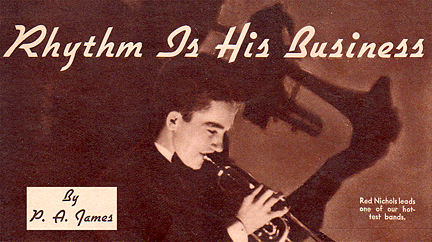This week’s Snapshot in Prose captures cornet and trumpet player Red Nichols at a relatively early point in his career, though he had already made hundreds of recordings under a variety of band names. But, to a certain degree, the more traditional jazz he favored, with its Dixieland flavor, was on the verge of being replaced by the new swing craze.
But Nichols survived and even thrived, continuing to record and perform until his death in 1965. In this 1935 profile, Nichols looks back at his salad days in the world of jazz.


Who plays the red-hottest trumpet in captivity? Red Nichols! Who has the grandest, wavy red hair and come-hitherest laughing brown eyes? Red Nichols! Yet, this utterly charming and totally unaffected young maestro, who became famous from the hour “Red Nichols and His Five Pennies” lit on Broadway, is almost shy.
The day, recently, when this fascinating, slim young leader celebrated his thirtieth birthday, he was also congratulated upon having devoted a quarter of a century to the art of playing a trumpet!
The “veteran” is of medium height. He doesn’t tan tan but red, and his face retains its ruddiness from one season to the next. While Red is remarkably good-humored, he literally sees red when he has to do with chiselers and liars. For the big red haired boy is a square straight-shooter himself.
He was born thirty miles from Salt Lake City. He lists Brigham Young among the half-dozen greatest men in history. However, the Nichols family were not practical Mormons.
Red’s father, E. W. Nichols, was professor of music at Weber College, Ogden, Utah, and at the State University in Salt Lake City. When little E. Loring (Red, to us) was three years old he was running around with a silver-plated trumpet in his mouth. At five, he played “America” before Weber’s entire student body.
“I always loved the cornet best. My trumpet technique improved under the guidance of Captain O’Callaghan,” he told me.
The boy was a good student. He also excelled on the track, and at basketball. A military career loomed ahead. For strangely enough, Red’s parents strenuously objected to their son having a musical career, unless he would devote himself exclusively to the classics.

“I ran away from home, the summer I was sixteen, to join a dance band at Piquet, Ohio,” the affable leader said. “It was called the Syncopating Five. We got stranded in Indianapolis. There was no work. I wouldn’t go home. Washed dishes in a lunch room for three weeks for my food.”
“Then, with nothing at all, I got Ralph Dunkee, of the now famous Sisters of the Skillet and organized a cooperative dance band. In Lake James, Indiana, we found ourselves broke. Luckily, about that time along came the Syncopating Five, and asked me—” Red gave us one of those priceless, roguish looks, and went on, “or rather I asked them, if I could have a job again.
